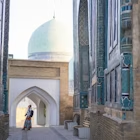

Tokyo's Hotel Gracery has a giant โ maybe even life-size? โ statue of Godzilla on the rooftop ยฉ Jonathan Stokes / ภฯฐฤรลม๙บฯฒสฟชฝฑผวยผ
Welcome to Tokyo, where you can bed down among books, sleep in a fiberglass capsule or surrounded by original artwork; where robots complete the check in process and Godzilla looms large.
Sure, the city has plenty of ordinary hotels โ but who comes to Tokyo for ordinary? Here are our picks for the most unique stays in Tokyo.
Book and Bed is best for bibliophiles on a budget
Hostels have long had small libraries โ a bookshelf in the corner where guests could exchange their tattered paperbacks for new reads. Book and Bed asks the question: What if the library part were given equal prominence to the sleeping part?
The answer: cubby-like sleeping nooks fitted into plywood floor-to-ceiling bookshelves, filled with comic books, novels, travelogs, essay collections and more. This being Japan, the majority of the publications are in Japanese, but there is a selection of English reading material, including Japanese fiction in translation and books written in English about Japanese culture and history.
Book and Bed is also open during the afternoon as a lounge space (ยฅ700/US$5.50 per hour) to visitors who arenโt staying over โ great for a rainy day, or if you want to rest for a bit before heading back out to Shinjuku's bars and restaurants.
Location: Shinjuku
Whatโs nearby: Shinjuku-gyoen, Golden Gai, Tokyo Metropolitan Government Building

9 Hours is the best capsule-hotel experience
Capsule hotels offer a sleeping space the size of a single bed, with just enough headroom for you to sit up. Itโs like a bunk bed with more privacy โ thereโs usually a curtain to seal off the entrance, in addition to plastic or fiberglass walls on three sides.
Capsule hotels became popular in Japan in the 1980s, during the height of the countryโs work-hard-play-hard economic bubble, supposedly as a place for commuters to get a few hours of shut-eye before heading back to the office. While not for the claustrophobic, capsule hotels are definitely among the more unique accommodation options in Tokyo. Theyโre a neat experience as an alternative to a hostel, but they do have their own conventions, such as gender-segregated floors.
Traveler-friendly is our pick for first-time capsule-hotel guests, as all of the policies are explained in English. Also, the capsules are styled as futuristic space pods, and there are private shower booths instead of the usual communal baths. Our favorite branch is the one in Otemachi, because you can borrow running shoes for jogging around the Imperial Palace moat and get your morning coffee from nearby Glitch Coffee and Roasters.
Location: Otemachi
Whatโs nearby: Imperial Palace, National Museum of Modern Art
Reversible Destiny Lofts is the best apartment rental with a twist
This is a rare opportunity to sleep within one of Tokyoโs most eccentric architectural landmarks, the Reversible Destiny Lofts. Designed by husband and wife Arakawa Shลซsaku (1936โ2010) and Madeleine Gins (1941โ2014) and completed in 2005, this housing complex has nine units with undulating floors, spherical dens and ceiling hooks for hammocks and swings. It's all meant to create a sensory experience beyond the visual โ though the building is plenty colorful โ and maximum wonderment.
Two of the apartments are available for short-term rental. One sleeps two, and the other sleeps four; both have kitchens and washing machines. The rest are rented out to long-term tenants.
Location: Mitaka
Whatโs nearby: Ghibli Museum, Inokashira Park
Ryokan Sawanoya has the best traditional inn experience
Ryokan (Japanese-style inns) offer a traditional experience, with tatami (woven-mat floor) rooms and futons (quilt-like mattresses) on the floor instead of beds. They can be modern structures, or rambling, old wooden buildings that look straight out of a ukiyo-e (woodblock) print; humble inns, or the height of luxury. Many travelers look to Kyoto or a hot-spring resort for their ryokan experience, but it can be had in Tokyo, too.
Ryokan are famous for their hospitality, and thatโs where Ryokan Sawanoya really shines. This inn, run by the same family for three generations, has been welcoming international guests for decades and is beloved by travelers. In addition to the cozy rooms, there are traditional soaking tubs with garden views that can be used privately or by couples or families. Itโs in Yanesen, which is one of Tokyoโs most attractive districts, with many wooden buildings from the early 20th century.
Location: Yanesen
Whatโs nearby: Tokyo National Museum, Ueno Park, Yanaka Ginza

BnA Studio Akihabara is the best hotel for art lovers
BnAโs five rooms were designed by local artists and art collectives โ and itโs not just paintings on the wall, though thereโs that too. Each room has custom furniture and its own distinct vibe: thereโs one that riffs on a traditional Japanese dry-landscape garden, while another references the graffiti-covered playgrounds of the artistโs childhood.
But what truly makes BnA Studio stand out is its fee structure: for every room booked, a percentage of the profit goes back to the artists themselves. The rooms sleep two to four and have kitchens.
Location: Akihabara
Whatโs nearby: Kanda Myลjin, 3331 Arts Chiyoda, 2K540 Aki-Oka Artisan

Hotel Gracery is the best hotel for film fans
Tokyo loves a themed hotel, and around the capital you can find rooms with dรฉcor inspired by popular characters, like Hello Kitty at the Keio Plaza Hotel and Gundam at the Grand Nikko Tokyo Daiba. But the Hotel Gracery takes the concept to another level, with a giant โ maybe even life-size? โ statue of Godzilla on the rooftop. In addition to looking like heโs about to take a bite out of the building, every so often he roars to life, with glowing eyes and smoky breath.
A portmanteau of the Japanese words for gorilla (gorira) and whale (kujira), Godzilla is, of course, the king of the ฐ์ฒนพฑยแลซ (strange beasts) that ruled the country's popular cinema for decades, and the Hotel Gracery occupies the top floors of the Shinjuku Toho Building, named for the production company that brought him to life. The rooms themselves are modest, except for one that's kitted out in Godzilla paraphernalia and another with a direct view of the statue. Just one word of caution: the hotel is located in the (gentrifying) red-light district, Kabukicho.
Location: Shinjuku
Whatโs nearby: Shinjuku-gyoen, Golden Gai, Tokyo Metropolitan Government Building

Henn na Hotel is the best hotel run by robots
Make that the only hotel run by robots. While other properties are experimenting with delivery robots, Japanโs Henn na Hotel chain is the first to employ them for every customer-facing function, from check-in to check-out. (Donโt worry, there are humans hanging around should any problems arise, though they probably wonโt speak as many foreign languages as the robots do.)
The hotel made quite a media splash when it debuted a few years ago, and while the gimmick factor is high, the truth is more automation is likely coming to hotels in the near future. But how many of them will have a grouchy-looking T. rex heading up reception? There are now several branches around the city, but we pick , where the dinosaur works.
Location: Maihama
Whatโs nearby: Tokyo Disney Resort
Khaosan World is best for fans of kitsch
Love hotels โ in Japanese, rabu hoteru, or rabuho for short โ are designed for hookups. They tend to be clustered in nightlife districts (or off-highway exits) and have long had a reputation for over-the-top design. The reality, however, is that love hotels these days donโt look that different from ordinary hotels, and you can reserve them on popular booking sites.
Those that retain the kitschy splendor of old are often fairly tatty, so to experience a love hotel in spirit rather than function, look no further than Khaosan World, a hostel in a former love hotel. It's cleaned up, but with much of the original dรฉcor intact, like the mirrored ceilings and glittering brocade wallpaper. Choose from a wide variety of rooms, including ones with tatami floors and capsule-style bunks. There are cooking and laundry facilities too.
Location: Asakusa
Whatโs nearby: Sensล-ji, Tokyo Sky Tree, Asahi Super Dry Hall
Explore related stories



 FoodRiding Japanโs โNew Golden Routeโ: The vibrant cities of Tokyo, Kyoto and Osaka
FoodRiding Japanโs โNew Golden Routeโ: The vibrant cities of Tokyo, Kyoto and OsakaFeb 17, 2021 โข 8 min read
 HotelsExperience rural life in Japanโs Oita Prefecture with these tranquil farm stays
HotelsExperience rural life in Japanโs Oita Prefecture with these tranquil farm staysSep 3, 2019 โข 2 min read
 HotelsA retro capsule hotel in Tokyo has been brought to life with a modern redesign
HotelsA retro capsule hotel in Tokyo has been brought to life with a modern redesignFeb 1, 2018 โข 2 min read


 Destination PracticalitiesA first-time guide to Tahiti and French Polynesia
Destination PracticalitiesA first-time guide to Tahiti and French PolynesiaDec 4, 2024 โข 9 min read
 Destination PracticalitiesHow to get your cell phone connected in Japan: eSIMs, wi-fi and mobile networks
Destination PracticalitiesHow to get your cell phone connected in Japan: eSIMs, wi-fi and mobile networksNov 20, 2024 โข 6 min read

